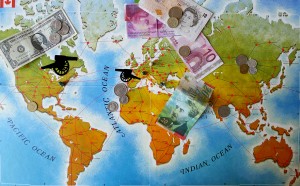Currency War
Loose talk distracts from real problems
It was in the early seventies of last century when the then Democratic US Secretary of the Treasury John Conally felt obliged to make an apodictic statement on the US-Dollar, “The dollar is our currency, but your problem.” In saying this he transferred the problem of the weak American currency to those in Europe who were critical of the American monetary policy at the time. It was the Deutsche Bundesbank in Frankfurt which was the addressee of this emphatic message. While the Germans pursued a strict stabilization policy, the Americans were inclined to accept a depreciation of the US-Dollar. This was commonly viewed as a welcome support for American exporters.
Our currency, but your problem
The idea that currency was an appropriate tool to influence economic activity was not all that new. In the 1930s, ‘beggar-thy-neighbor’ policy throughout the industrialized world led to a currency war which caused severe economic turbulence worldwide.
 Recently, talk about “currency wars” has made a comeback within the Eurozone. This is no small matter as it could have an impact on the relationship between the Euro and the other major currencies of the world: The US-dollar, the yen, the yuan, the pound sterling and the Swiss franc. Again it was the Bundesbank which was the target for these critical remarks. The G7 and G20 finance ministers reacted to this during their mid-February meeting issuing a statement:
Recently, talk about “currency wars” has made a comeback within the Eurozone. This is no small matter as it could have an impact on the relationship between the Euro and the other major currencies of the world: The US-dollar, the yen, the yuan, the pound sterling and the Swiss franc. Again it was the Bundesbank which was the target for these critical remarks. The G7 and G20 finance ministers reacted to this during their mid-February meeting issuing a statement:
“We, the G7 Ministers and Governors, reaffirm our longstanding commitment to market-determined exchange rates and to consult closely in regard to actions in foreign exchange markets. We reaffirm that our fiscal and monetary policies have been and will remain oriented towards meeting our respective domestic objectives using domestic instruments, and that we will not target exchange rates. We are agreed that excessive volatility and disorderly movements in exchange rates can have adverse implications for economic and financial stability. We will continue to consult closely on exchange markets and cooperate as appropriate.”
Although many voices have been critical of the G20 statement suggesting it was being soft on the issue, this is certainly not the case. First of all, the wording is more or less the same as the numerous statements issued by all of ECB President Mario Draghi’s predecessors whenever they were questioned on currency issues. So there is no indication of a policy change at the ECB.
More importantly, the G20 statement makes a valid point. Loose talk about “currency wars” is unhelpful as it distracts from the causes of the problem. We are no longer living in a period of competitive devaluations aimed at current account surpluses as in the 1930s. Instead, currency movements are a side-effect of diverging monetary policies which are primarily aimed at stimulating growth. In the case of Switzerland, it is aimed at countering the effect of overwhelming capital inflows due to the flight to quality.
Focus should now be on the pound sterling
While effective exchange rates have remained quite stable for the dollar and the euro, the yen has only depreciated following a prolonged period of appreciation which started in 2009 and has not yet been reversed. Similarly, the Swiss franc, which is subject to official intervention within certain ranges, had appreciated strongly before. If at all, focus should now be on the pound sterling which is down some 20% in trade-weighted terms from 2005 levels.
This is not to say that loose monetary policies are not risky and clearly such policies have repercussions on exchange rates. Nonetheless, it is the appropriate design of monetary policies in times of macroeconomic instability which should be the focus of the debate. Additionally, we should not lose sight of the fact that exchange rates are impacted by a number of other factors too, not least by political turbulence. The recent election in Italy is proof of this.
